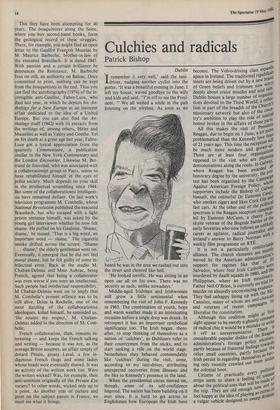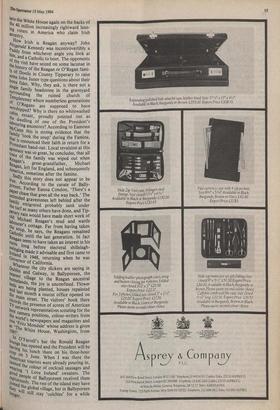Culchies and radicals
Patrick Bishop
Dublin T remember it very well,' said the taxi-
driver, nudging another cyclist into the gutter. 'It was a beautiful evening in June. I left my house, waved goodbye to the wife and kids and said, "I'm off to see the Presi- dent. " We all waited a while in the pub listening on the wireless. As soon as we heard he was in the area we rushed out into the street and cheered like hell.
`He looked terrific. He was sitting in an open car all on his own. There was no security as such, unlike nowadays.'
Middle-aged Irishmen and Irishwomen still grow a little sentimental when remembering the visit of John F. Kennedy in 1963. The combination of youth, hope and warm weather made it an intoxicating occasion before a single drop was drunk. In retrospect it has an important symbolical significance too. The Irish began, there- after, to stop thinking of themselves as a nation of `culchies', as Dubliners refer to their countrymen from the sticks, and to start seeking a role on the world stage. Nonetheless they behaved commendably like `culchies' during the visit, some, according to my taxi-driver, attributing unexpected recoveries from illnesses and the like to Kennedy's presence in the land.
When the presidential circus moved on, though, some of its self-confidence lingered. The nation has been building on it ever since. It is hard to get across to Englishmen how European the Irish have
become. The Volvo-driving class exPancis, apace in Ireland. The traditional republican tenets are being driven out by a new brand of Green beliefs and Irishmen now worry deeply about cruise missiles and acid rain' Dublin houses a large number of organisa• tions devoted to the Third World, a reflec- tion in part of the breadth of the Churchs missionary network but also of the coati- try's ambition to play the role of neutral honest broker in the affairs of those parts• All this makes the visit of President Reagan, due to begin on 1 June, a lot roor'" problematical than the Kennedy love fe..,491 of 21 years ago. This time the reception "; be much more modern and grc'val-ur• oThpperoesed to are at leastvisit fwouhor aroregaripiisanatrilrin; demonstrations along the route. In GalwaY' where Reagan has been awarded an honorary degree by the university, the Pr °- test has been organised by the CaMPaign Against American Foreign Policy, w_ill°:e y supporters include the Bishop of himself, the colourful Dr Eamollo Case who smokes cigars and likes Cork Gin ; fast cars. At the other end of the P°Iit.i'ca spectrum is the Reagan reception earn12.7t, led by Eamonn McCann, a cheery skyite veteran of the Bogside battles of ely early Seventies who now follows ari career as agitator, radical journalist ar. a Ireland's answer to Barry Norman wit" weekly film programme on RTE. It is not a particularly cool alliance. The church elements are ota"",'s support for regimes like that °f re moved by the American administrationo Salvador, where four Irish Catholics wehe murdered by death squads in 1980, and t, Philippines, where an Irish missionn,",r' Father Neil O'Brien, is currently on trial They feel unhappy lining up murder on absurdly unconvincing evidelcZ_ fortanliev with the .1%4 aCnadn n ivt eest e, rma hasn y of recent whom t area Ina npt to liberalise the constitution. Although this coalition might at nriaarstt sight appear to be merely a ghostlY re"Ate of radical chic it would be a mistaThere " :s it off as unrepresentative. considerable popular dislike of the administration's foreign policy excesses, partly because of fraternal feelings towards other small countries, partly becauser;v_ Irish persist in regarding themselves as Aer the colonial boot. ing only recently crawled out from un" ()mica' Citizens of practically every P unease stripe seem to share a feeling of e of }z eageosi_, about the political uses that will be maout to the trip. They are old enough now o feel happy at the idea of playing as extr g°abonic a vulgar vehicle designed to sweep into the White House again on the backs of the 40 million increasingly rightward lean- ing voters in America who claim Irish ancestry. ,How Irish is Reagan anyway? John raZgerald Kennedy was incontrovertibly a him, from whichever angle you look at "nil, and a Catholic to boot. The opponents of the visit have seized on some lacunae in the history of the Reagan or O'Regan fami- ly of Doolis in County Tipperary to raise some John Junor type questions about their Dona fides. Why, they ask, is there not a single family headstone in the graveyard ..,surrounding the ruined church of Ternpletenny where numberless generations of O'Regans are supposed to have Worshipped? Why is there no whitewashed Cabin extant, proudly pointed out as the dwelling of one of the President's labouring ancestors? According to Eamonn family 'took the soup' during the Famine, that is renounced their faith in return for a Protestant hand-out. Local revulsion at this apostasy was so great, he concludes, that all trace of the family was wiped out when eagan' s great-grandfather, Michael Reagan left for England, and subsequently America, sometime after the famine. t Sadly this story does not appear to be rue. According to the curate of Bally- r)(3reen, Father Eanna Condon, 'There's a PaPer chase that goes all the way back.' The /untended gravestones left behind after the trily emigrated probably sank under r2 turf as many others have done, and Tip- 'rarY rain would have made short work of d Michael Reagan's mud and wattle old cottage. Far from having taken trnhe,souP, he says, the Reagans remained Reagan until the last generation. In fact r Nan seem to have taken an interest in his swinging long before electoral shillelagh- irviinging made it advisable and first came to Governor in 1948, returning when he was `-mvernor of California. t)Whatever the city slickers are saying in ublin and Galway, in Ballyporeen, the kearest village to the Reagan ancestral 'inelands the joy is unconfined. Flower abeds are being planted, houses repainted the main street. The visitors' book there .cords dsthe presence of scores of American network representatives scouting for the tst camera positions, colour-writers from
one world's newspapers and magazines and a:85.e 'Fritz Mondale' whose address is given The White House, Washington, from ,9
10 in O'Farrell's bar the Ronald Reagan tinge has opened and the President will be having his lunch there on his three-hour stop on 3 June. When I was there the tit erican tourists were already pouring in, wde ned the colour of cocktail sausages and gor,adring 1 Love Ireland' sweaters. The rai;t" OeoPle of Ballyporeen received them jui.ur°uslY. The rest of the island may have thened the global village, but in Ballyporeen longerwill still stay 'culchies' for a while















































 Previous page
Previous page